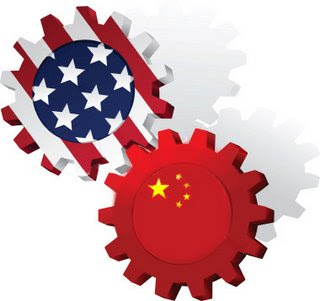Reports on censorship by the People’s Republic of China (PRC) Government of Google, coupled with internet hacking, finally highlighted, in January 2010, the worsening of relations between the two so-called superpowers: last year’s much-heralded “G2” or interdependent “Chimerica”. But more important conflicts rumble behind the uproar, inside as well as between the two states.
Firstly, Google searches themselves bring up literature on uninterrupted, interstate asymmetric “unrestricted (better, unlimited) warfare” (chao xian zhan: literally leap limits war), including cyberwarfare. It was explicitly advocated some years ago by two PLA colonels. China-based hackers have long been attacking not only US Defense and other Government sites, but those of industrial corporations; not just in the US, but in Europe and, for example, India.
State of Cyberwar; Copenhagen and Climategate
Secondly, the question arises, as in the case of Russia: cui bono [to whose benefit]? Or, rather, who is really in charge in the PRC or in the jurisdiction from whence the attacks originate? Without the connivance or support of what State elements – eg: the military or Public Security – could these cyberattacks on foreign targets be made?
The Center for Strategic and International Studies (CSIS) in Washington, DC, put out a report at the recent Davos economic forum on how some 600 critical infrastructure enterprises in 14 countries claim that their IT systems are under “repeated attack by high-level adversaries”.
Sir David King, former top science adviser to the British Government, speculated that the hacking of emails casting doubt on the “science” relied on by the United Nations Climate Change panel (IPCC) was too sophisticated to have been done by anyone other than a foreign intelligence service, with the aim of sabotaging the Copenhagen conference.
In history, information censorship and espionage for a period enabled authoritarian governments to achieve two objectives: (1) stifle “dangerous thoughts” in domestic politics, while (2) outsourcing to the capitalist or “free enterprise” world the market action, ergo innovation and technological productivity, which was also stifled at home by the censorship, but essential for sustainable economic development.
The USSR, essentially a military dictatorship, like pre-war militarist Japan, developed by stealing, reverse engineering, copying, and improving on “Western” technology; the same method I saw in action during 1980/80s visits to State-owned PRC enterprises (SOEs).
The Soviet juggernaut, once hailed as a rival model to capitalism, eventually seized up. When will it be the turn of the vaunted China model?


Be the first to comment on "China versus the United States: States of Disunion?"